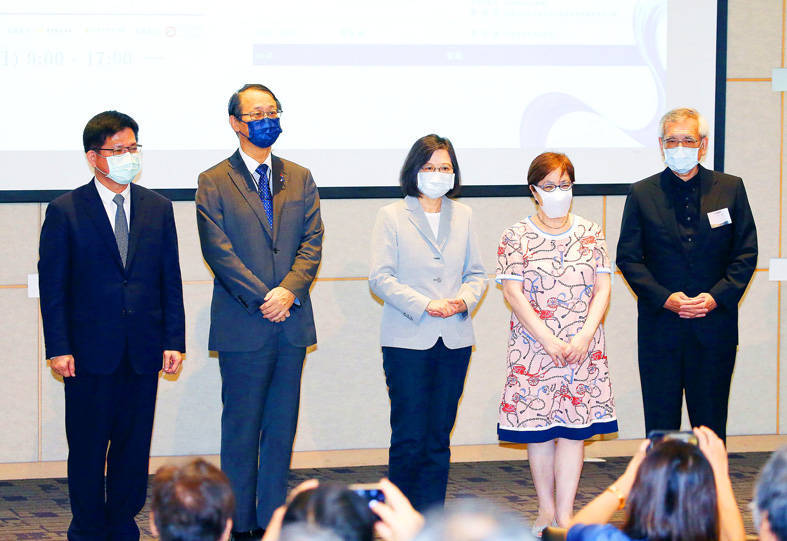《TAIPEI TIMES》 Japan group to aid Taipei’s CPTPP bid

From left, Taiwan Thinktank cofounder Lin Chia-lung, Japan-Taiwan Exchange Association Representative Hiroyasu Izumi, President Tsai Ing-wen, Lee Teng-hui Foundation president Annie Lee and her husband, Lai Kuo-chou, pose for a photograph at a forum on Taiwan-Japan relations in Taipei yesterday. Photo: CNA
THE LEE EFFECT: Taiwanese have a strong sense of identity separate from China, which ‘will be important to protecting Taiwan’s sovereignty,’ the head of JTEA said
By Chen Yu-fu and William Hetherington / Staff reporter, with staff writer
The Japan-Taiwan Exchange Association (JTEA) is prioritizing helping Taiwan gain entry into the Comprehensive and Progressive Agreement for Trans-Pacific Partnership (CPTPP), Japanese Representative to Taiwan Hiroyasu Izumi said yesterday.
Joining the trade agreement would be important to “maintaining the status quo [in the Taiwan Strait] and ensuring Taiwan’s survival,” association head Izumi said at a forum organized by the Lee Teng-hui Foundation in Taipei to discuss Taiwan-Japan relations.
Izumi cited a discussion that former president Lee Teng-hui (李登輝) had with Japanese author Ryotaro Shiba, in which Lee told the writer that Taiwanese have a sadness that could only be resolved through developing a national consciousness that sees Taiwan and Taiwanese as separate from China, Izumi said.
“Young Taiwanese are now thinking about what to do for the future of Taiwan, and whenever I see young people return to their hometowns to vote on election day, I think about former president Lee,” Izumi said.
“I believe that Taiwanese today have a strong sense of their identity as Taiwanese, and that will be important to protecting Taiwan’s sovereignty,” he added.
Echoing late Japanese prime minister Shinzo Abe’s words that “an emergency for Taiwan is an emergency for Japan,” Izumi said Taiwan is strategically important to Japan and the US, and this was demonstrated in Japan’s continuous commitment to safeguarding Taiwan’s sovereignty and security.
Japan and Taiwan can cooperate economically in many areas, such as in green energy, semiconductors and biotechnology, he added.
Citing an example, Izumi said that Japan’s strengths in the development of chemicals could benefit Taiwan’s semiconductor sector, creating a more robust supply chain.
“There are still myriad ways that Japan and Taiwan can cooperate. I feel that my most important task in coming to Taiwan has been to promote Taiwan’s entry into the CPTPP,” he said.
Taiwan has made strides in promoting trade with Southeast Asian countries through the New Southbound Policy, but it should also be given membership in international organizations such as the CPTPP and the Regional Comprehensive Economic Partnership, he said.
“Taiwan ranks among the CPTPP member states in terms of population, economic scale and technological strength, represented by its semiconductor sector,” he said.
“The inclusion of Taiwan as an economy in the CPTPP is absolutely essential to Taiwan’s future,” he said.
The Lee Teng-hui Foundation had invited Abe to give the keynote address, but Izumi was asked to speak in his place, after the former prime minister was assassinated on July 8 at a campaign event in Nara, Japan.
At the start of the forum, a moment of silence was observed for Abe, who died at the age of 67, less than two years after he resigned as Japan’s longest-serving prime minister.
President Tsai Ing-wen (蔡英文) also spoke at the forum, emphasizing cooperation with Japan and laying out three goals for her administration: to strengthen substantive economic and trade exchanges, continue to deepen educational and cultural exchanges, and engage in normalized regional security cooperation.
Citing Lee, Tsai said that Japan and Taiwan should cooperate not only because of geographic proximity and cultural similarities, but also because of shared values such as respect for peace, democracy and human rights.
Tsai also said that Taiwan has made all the necessary preparations to meet the high standards of the CPTPP, with the hope of gaining entry as soon as possible.
Australia, Brunei, Canada, Chile, Japan, Malaysia, Mexico, New Zealand, Peru, Singapore and Vietnam are the CPTPP’s 11 signatories.
Taiwan applied to join on Sept. 22 last year, less than a week after China submitted its application.
Additional reporting by CNA
新聞來源:TAIPEI TIMES
















